Nikon D4S Review
Nikon D4S Introduction
The Nikon D4S is their top-of-the-line professional DSLR. This 16 megapixels full-frame DSLR is an imposing camera with two grips each having dual control-dials and a considerable amount of controls. Designed for high-performance, the D4S reaches a stellar ISO 409,600 and full-resolution continuous drive at 11 FPS for over 200 frames.
This DSLR is a powerhouse for professional photographers. It has every feature expected from its class and more like a built-in viewfinder shutter, built-in HTTP server, FTP client, wired Ethernet port and dual memory-card slots.
This extremely capable DSLR is compatible with Nikon FX lenses designed for full-frame digital and film cameras and Nikon's own Creative Lighting System for studio photography. There is a requisite hot-shoe plus a sync-port but no built-in flash. The D4S is remotely controllable by wired release, networked computer and even iPhone with the right accessory. Its highly customizable controls can be adjusted to various needs of photographers.
As the D4S is nearly identical to the Nikon D4 reviewed in-depth already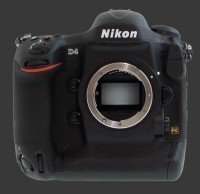
Nikon D4, this review page covers differences only. For image-quality and performance, skip to the Performance page.
Nikon D4S Features
Sensor
- 16 Megapixels CMOS sensor
- Full-Fame Nikon FX format
- Standard ISO 100 - 25,600 range
- Expanded ISO 50 - 409,600 range
- Customizable Auto ISO
- Built-in Dust-Reduction
- JPEG, TIFF, RAW, JPEG+RAW or sRAW Output
Exposure
- PASM exposure modes
- 1/8000s - 30s Shutter-speed, plus Bulb
- EC, ±5 EV, 1/2 or 1/3 EV steps
- FC, -3...+1 EV, 1/2 or 1/3 EV steps
- Matrix, Center-Weighed, Average & Spot metering
- AEB, 2, 3 or 5 frames, maximum 3 EV steps, 7 or 9 frames, maximum 1 EV steps
- Flash Bracketing, 2 - 9 frames, maximum 1 EV steps
- Exposure Fine-Tuning, ±1 EV, 1/6 EV steps
- Exposure and ISO steps of 1, ½ or 1/3 EV
- HDR, 2 shots, 1-3 EV steps, 3 blending levels, single image or series
Focus & Drive
- 51-Point Phase-Detect autofocus system
- 15 cross-type points, 11 sensitive to F/8
- Autofocus sensitivity down to -2 EV
- Single-Shot and Continuous focus-drive
- Single-Point, Dynamic-Area and Auto focus-point
- 3D Tracking AF with OVF and Live-View
- Contrast-detect AF for Live-View and video
- Face-Detect AF in Live-View
- 11 FPS Drive with AF/AE, 200 JPEG or 78 RAW maximum at highest quality
- Customizable Self-Timer, 1-9 Shots, 2-20s Start Delay, ½-3s Interval
- Quiet-Shutter with delayed mirror-return
- Mirror-Up and Exposure-Delay, 1-3s
- Multiple-Exposure, 2-10 shots, optional Auto Gain
- Interval-Timer, 1-9999 times, 1-9 shots, 1s-24h interval, delayed start 1m-1w
- Time-Lapse, 1s-10m interval, 1m-8h capture time
- Optional Autofocus Fine-Tuning
Images Parameters
- AutomaticTwo types: Normal & Preserve Warm Colors, Preset, Kelvin and Custom4 Memories WB
- Preset White-Balance fine-tuning, 2-axis, 13-steps
- Kelvin White-Balance fine-tuning, 1 axis, 13-steps
- Picture Styles, 6 built-in plus user-defined
- Automatic or Manual Sharpness, 10 steps
- Automatic or Manual Contrast, 7 steps
- Automatic or Manual Saturation, 7 steps
- Manually Adjustable Hue, 7 steps
- Manually Adjustable Tone-Curve, 3 levels
- Virtual WB Bracketing, 2-9 frames, 3 steps, 2 axis
- Virtual Active D-Lighting Bracketing, 2 - 5 frames
- Optional High-ISO Noise Reduction, 3 levels
- Optional Long Shutter Noise Reduction
- Optional Distortion-Correction
- Optional Vignetting-Correction
- Optional Active D-Lighting (ADL), 5 levels or Auto
- Optional Dust-Off reference photo
- In-Camera RAW development
Controls
- Dual control-dials for each grip
- 8-Way joysticks for each grip
- 8-Way controller for horizontal grip
- Configurable AF-On button for each grip
- Modeless exposure-mode button
- Modal drive-mode dial
- Independent AEB button
- Customizable Function button
- Customizable DOF-Preview button
- Customizable Video-Record button
- Customizable button in vertical grip
- Live-View trigger
- Focus-Point lock
Viewfinder & Displays
- 100% Coverage viewfinder, 0.7X magnification
- Built-in viewfinder shutter
- 3.2" LCD, 920K Pixels
- Illuminated top LCD status display
- Illuminated rear LCD status display
- Dual-Axis Digital-Level
- DOF-Preview in viewfinder
- Mechanical-Shutter Live-View
- Electronic-Shutter Live-View, 2 MP, 24 FPS
- Optional OVF composition grid
- Optional OVF overlay, 1.2X, DX or 5:4
- Sound-Level monitor
Body & Construction
- Nikon F-mount
- Weather-sealed body
- Integrated vertical grip
- Hot-Shoe and Sync-Port for external lighting
- Compact Flash memory slot
- XQD memory slot
- Proprietary Lithium-Ion battery
- Remove Live-View other Ethernet
- GPS or wired remote connector
- Built-in HTTP server
- Built-in FTP client
- 1080p HDMI output
- Gigabit Ethernet
- Metal tripod mount
Video
- 1920x1080 @ 60 FPS 16:9 HD Video
- 1280x720 @ 60 FPS 16:9 HD Video
- Built-in microphone, 20 levels
- Stereo sound-input mini-jack
- Stereo sound-output mini-jack
- Quicktime H.264 codec
- Index marking
Nikon D4S Capability - What can it do?
The Nikon D4s is among the most feature-rich digital cameras ever built, taking on the incredible feature list of its predecessor and refining a number of them. Both these cameras offer functions which are unique between them which you can read about in the Capability page of the D4 review.
The two major changes of the D4s are a new image-sensor and faster EXPEED 4 processor. The revised 16 megapixels CMOS sensor offers a standard ISO sensitivity range up of 100 - 25600. It also supports expanded ISO 50 and 51200 to 409,600 which is unprecedented. Only one other digital camera has been announced with that sensitivity which is the Sony Alpha A7S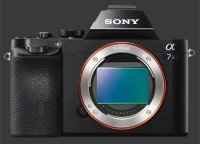
Sony Alpha A7S full-frame mirrorless.
The EXPEED 4 processor delivers faster performance. Together with a newly-revised mirror-mechanism which reduces black-out time, this lets the D4S maintain full autofocus and auto-exposure while shooting at 11 FPS. Buffering has been improved to allow up to 200 JPEG images at maximum image-quality or up to 78 losslessly-compressed RAW files at maximum bit-depth.
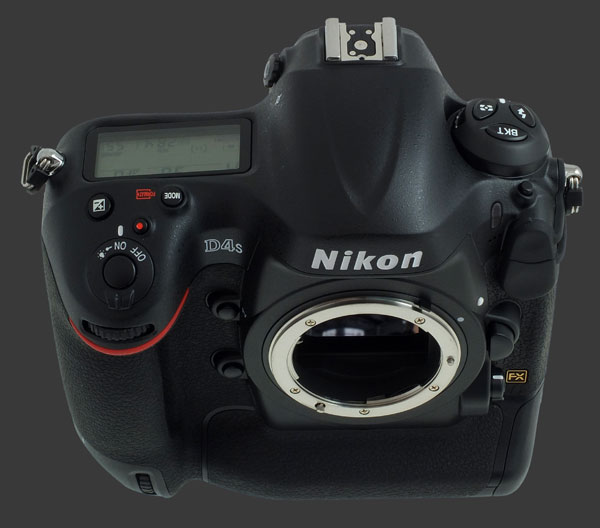
Nikon has a tradition of offering various types of RAW files and, this time, they added one more. First, just like most Nikon full-frame models, there is a choice of 14 or 12 bits. The former allows more color gradation and nuances, while using slightly more storage. While both are RAW files, which only contain one channel per pixel, the latter obviously loses some data which means should not be considered truly RAW but unprocessed. There is a choice of compression, including none, lossless and lossy. This last option saves space at the expense of image-quality but far less than JPEG compression.
The Nikon D4s adds a new Small RAW format which offers an entirely different image-quality compromise. It is, however, heavily processed to produce an 8 MP file with 12-bits per component in YCbCr format. This gives an image with a luminance channel plus deltas along the Blue and Red direction to determine colors. In practice, this is much closer to a JPEG with extra-bit-depth than what is typically known as RAW sensor data.
This DSLR provides the most advanced Interval-Timer feature of any digital camera. It can now capture 9,999 images automatically. The interval between frames can be set between 1 second and 24 hours. Up to 9 frames can be captured at each interval which makes it possible to bracket for exposure throughout the capture period. Shooting can start immediately or up to one week later. Previously, the maximum delay was 24 hours.
New to the Interval-Timer and Time-Lapse Video is an Exposure-Smoothing option. When enabled, instead of metering each frame completely independently, the D4s tried to make transitions between successive frames smoother. When assembled into a time-lapse, this results in a smoother video. One example is when shooting moving traffic. As cars pass, the metered exposure can vary greatly.
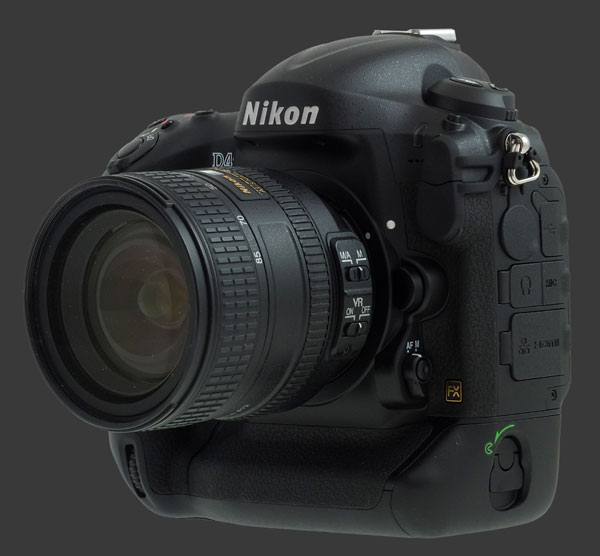
Video
Full 1080p HD video has been possible on Nikon DSLRs for a while. This one adds a number of improvements over previous generations. It can record 1080p at up to 60 FPS, with 50, 30, 25 and 24 FPS available as options. This can be output as a clean 1080p signal over HDMI while simultaneously recording onto a memory card with Quicktime format and H.264 codec.
Considering that even full HD video only requires 2 megapixels, the D4s allows video to be captured from a cropped-area of the sensor. FX (Full-Frame), DX (APS-C) and 2.7X (Nikon 1) crops are all selectable during Live-View.
Audio has been enhanced too. The recording levels can be adjusted during filming and the frequency-range of the built-in microphone can be optionally tuned for voices. There are still mini-jacks for stereo input and output. Video capture allows full manual-controls, including Auto ISO in Manual mode which lets the camera film with a constant aperture and shutter-speed while maintaining the metered exposure. Expanded sensitivities, up to ISO 409,600 are possible but not ISO 50 or 100.
Time-Lapse video uses current Movie settings which makes it possible to play back at up to 60 FPS, although twice the number of source files are obviously needed for the same length of video.
Body
Physically the D4s looks nearly identical to the D4. It somewhat heavier at 1350 versus 1180 grams. While this is a non-trivial increase, the difference is hard to notice when a quality lens is attached. Controls to the right of the LCD were slightly reshaped. Both joysticks now have a texture to improve traction and usability with gloves. The 8-way controller feels stiffer and a little harder to move though.
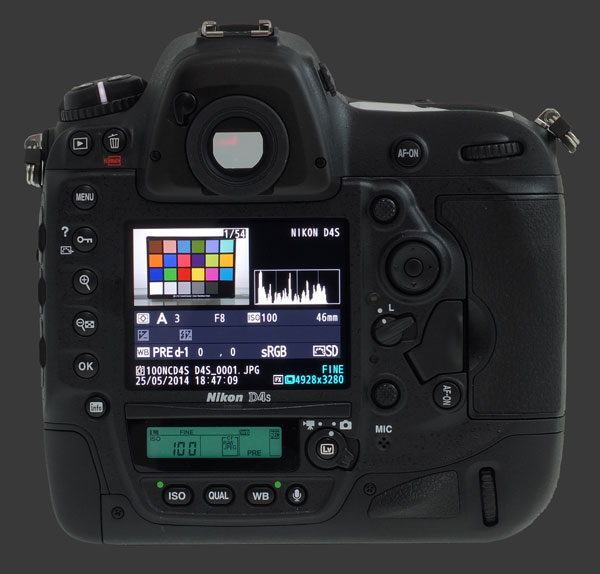
While the network port looks the same, it is 10X faster than before, offering Gigabit Ethernet now. USB remains at 2.0 which seems slightly behind times. Nikon still has not decided on a memory-card type as D4s continues to offer asymetric slots. One is Compact Flash Type 1 and the other is XQD. We hope to see a pair of identical slots on the next model.
The new 16 megapixels sensor and EXPEED 4 processors at the heart of the Nikon D4s are less power-hungry than their predecessors. This lets the D4s reach a whopping 3020 shots-per-charge, compared to an already stellar 2600 according the the CIPA standard.
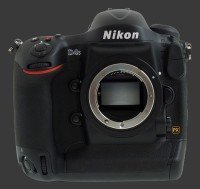 |
Please Support Neocamera
All information on Neocamera is provided free of charge yet running this website is a huge endeavor. Purchases made via affiliate links found throughout the site help keep it running and up-to-date. There is no additional cost to you, so please consider buying via these links to our affilates:
If you found any information on this site valuable and did not purchase via our affiliate links, please considering donating via PayPal:
Any amount will be greatly appreaciated. Thank you for your support!
Nikon D4S Highlights

Sensor-Size: 36 x 24mm

Actual size when viewed at 100 DPI
| 16 Megapixels DSLR | ISO 50-409600 |
| Nikon F Mount 1X FLM | Shutter 1/8000-30s |
| 100% Coverage Extra Large Viewfinder | Full manual controls, including Manual Focus |
| 2 Axis Digital Level | Custom white-balance with 2 axis fine-tuning |
| Weatherproof | Spot-Metering |
| Built-in Dust Reduction | Hot-Shoe & Sync-Port |
| 11 FPS Drive, 200 Images | Stereo audio input |
| 1920x1080 @ 60 FPS Video Recording | Lithium-Ion Battery |
| 3.2" LCD 920K Pixels | Compact Flash Type 1, XQD |
Updates
2024.11.18

Best 2024 Photography Gifts for Every Budget
Great gifts for photographers and photo enthusiasts selected for every budget among the best products of 2024.
2024.08.07

Eye Protection Tips for Professional Photographers
The four main considerations for professional photographers regarding eyewear.
2024.07.14

Fujifilm X100VI Review
Flagship fixed-lens compact digital camera with a 40 MP sensor and Image-Stabilization, a first for the series. Retro design featuring dual control-dials, plus direct ISO, Shutter-Speed and EC dials. Its hybrid viewfinder can switch between EVF and OVF mode.
2024.05.09

Fujifilm GFX100 II Review
Flagship 102 Megapixels Medium-Format Mirrorless Digital Camera with 8-Stop 5-Axis IBIS, 8 FPS Drive, 8K Video and 400 MP Super-Resolution capture in a weatherproof and freezeproof body with dual control-dials and dual memory-card slots.
2024.04.03

Fujifilm X-T5 Review
Newest Fujifilm flagship boasting a 40 MP APS-C sensor, 5-axis IBIS with 7-stop efficiency, 15 FPS continuous drive, 6.2K Video capture, dual control-dials and dual SDXC UHS-II slots in a sturdy weatherproof and freezeproof body.
2023.11.20

Best Digital Cameras of 2023
Find out which are the Best Digital Cameras of 2023. All the new Mirrorless Digital Cameras from entry-level to high-end professional.
2023.07.10

Fujifilm X-H2 Review
40 Megapixels APS-C Hybrid Mirrorless Digital Camera with 7-stop IBIS. Fastest shutter ever and 8K video capture. Large builtin EVF with 0.8X magnification and 5.8 MP, plus an Eye-Start Sensor. Packed with features and large number of controls in a weatherproof and freezeproof body.
2023.05.07

Sony FE 20-70mm F/4G Review
Review of the unique Sony FE 20-70mm F/4G lens. The optical zoom of this lens spans ultra-wide-angle and medium focal-length coverage, making it one of the most versatile Full-Frame lenses on the market.
2023.01.15

Huion Inspiroy Dial 2 Review
Review of the Huion Inspiroy Dial 2 tablet, a medium sized drawing surface with dual dials and customizable buttons. Connects via USB-C or Bluetooth 5.0 with Windows, Linux and Android support.
2022.12.08

How to Pack for a Photo Trip
Find out how to pack for a travel photography trip, carry your gear safely while meeting airline regulations.
2022.11.13

Best Digital Cameras of 2022
The best digital cameras of 2022. A short list of the most outstanding models in their respective categories. Choose one for yourself or as a gift.
2022.09.21

Pentax DA* 60-250mm F/4 SDM Review
Review of the Pentax DA* 60-250mm F/4 SDM, the constant-aperture telephoto zoom with the highest zoom-ratio on the market.












